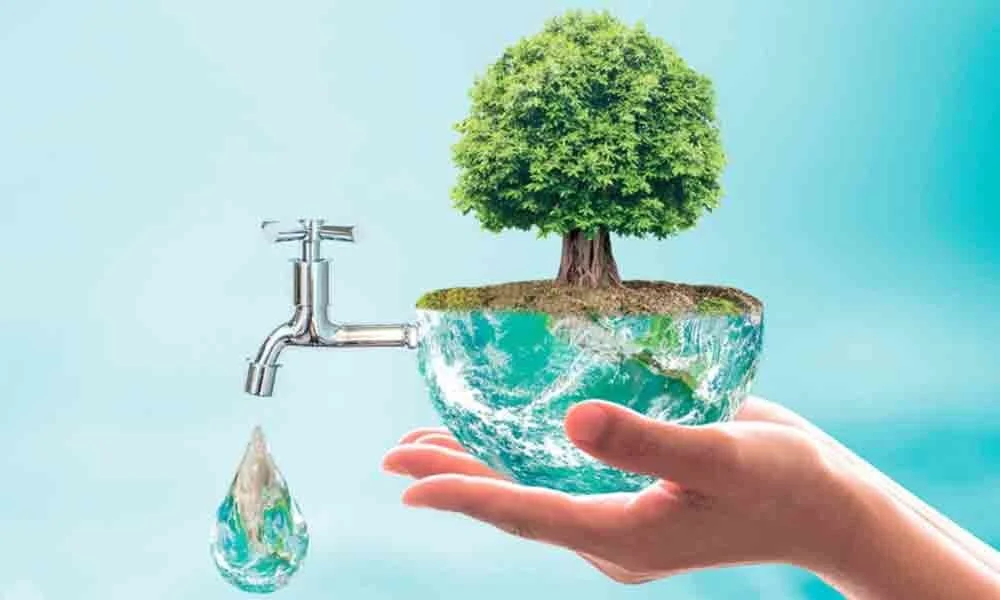Protecting Our Water Supply
We often take for granted the water that flows endlessly from our taps. The main source of that water in the Aquetong watershed is pumped groundwater from public (maintained by Bucks County Water and Sewer Authority) or private wells. Water that goes down the drains/flushed is pumped to Lambertville to be treated and then is discharged into the Delaware River. Therefore, any water that is pumped out of the aquifer is a net loss to our groundwater system, because the used water does not re-enter and recharge the groundwater (unless you are watering plants), it is pumped away. Groundwater is recharged through rain, snow melt, and surface water. Groundwater is withdrawn through springs, surface water, and pumping.
According to a 2020 study, groundwater withdrawal in Solebury is currently less than recharge rates, so we are not taking too much water from the system - that’s a good thing (withdraw < recharge). Due to the complexity of local hydrogeology and climate, it is not known exactly how much water can be safely withdrawal before we take too much a begin to deplete the aquifer (withdraw > recharge). It is important that we maintain this careful balance by not wasting water and limiting development that would increase water demand.
Home water saving tips:
Fix leaky faucets, toilets, and hoses.
Sweep driveway, steps, sidewalk instead of hosing off.
Always turn off water when not using (examples: in between dishes while washing by hand, when brushing teeth, when shaving).
Run the dishwasher and washing machine only when loads are full.
Take shorter, cooler-temperature showers (aim for 5 minutes).
Wash laundry in cold water.
If you like drinking cold water, keep a pitcher in the fridge rather than running until the tap is cold.
Thaw frozen food in the refrigerator or sitting in water, do not run fresh water over it
Wash the car with a bucket or use a professional car wash. Wash your car on the lawn rather than the driveway.
Replace appliances with water efficient, WaterSense labeled products. Toilets, dishwashers, washing machines, and shower heads can all be efficient.
If you have a pool or hot tub, keep it covered when not in use to prevent evaporation.
Scatter leftover ice on your lawn.
Take steps to reduce energy consumption – water is used at many points in the process of producing electricity.
Water Reclaiming Ideas:
Save pasta water or water used to boil/steam veggies (if you did not salt it).
Collect water used while heating up water (eg, sink, shower) in a bucket.
Save water from rinsing vegetables.
Collect “old” water from cups or bottles rather than dumping down the drain.
Store reclaimed water in a closed container or rain barrel so mosquitos do not use it.
Garden water saving tips:
Do not water your lawn.
Add compost to your soil – the more organic matter in your soil, the more moisture it can retain.
Use mulch on garden beds to keep soil moist and can also add organic matter to your soil.
Water the soil around roots of the plants not the leaves – this will prevent evaporation and ensure the roots get water, cool roots will cool the plant.
Water plants in cooler parts of day (especially early morning).
Install soaker hoses or drip irrigation system to efficiently apply water. Avoid using sprinklers (photo #1)
Use reclaimed water in your garden as much as possible.
Use an oya in your garden beds – you can make one by burying a large terra cotta pot in your bed, fill with water and cover. This indigenous device will slowly water your soil (photo #2)
Install a rain barrel or keep a covered bin outside to store your reclaimed water.
Reduce your area of lawn and plant native plants.
Add food waste to the compost pile rather than using garbage disposal.
Return to Environmental Tips




